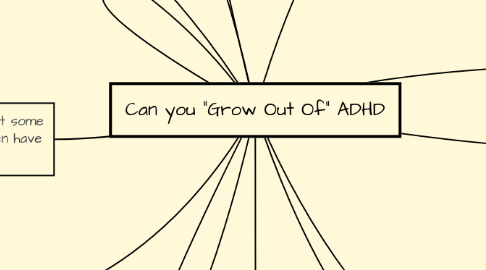Can you "Grow Out Of" ADHD
Koleka Casimir Gottfriedsonにより


1. Roughly 10.2 percent of children are diagnosed with ADHD
1.1. Maths
1.1.1. Text book, exercises 34, 35, 36, 37
2. Only one participant had been prescribed medication. These participants were compared to 34 young adults who hadn’t been diagnosed with ADHD or any other developmental disability.
2.1. Physics
2.1.1. Research and prepare experiment
3. Determined whether or not young adults who had been diagnosed with ADHD as teenagers had significantly different brain structures than their neurologically healthy peers.
3.1. Spanish
3.1.1. New vocabulary
4. Recent research shows that some adults with ADHD did not even have symptoms in childhood
5. Researchers focused on 49 young adults within this cohort who were diagnosed with ADHD at the age of 16 and were now aged from 20 to 24 years
6. The researchers compared brain scans between the two groups,
7. ADHD doesn’t disappear just because symptoms become less obvious—its effect on the brain lingers
8. My older cousin was diagnosed with ADHD when we were little but up until he was diagnosed we had no clue.
9. Nothing really changed other than if he was having a bad day, gradually he was given medication to help. In my opinion is seemed worse, because he relied on it, once he stop taking it...everyone knew when he stopped.
10. He is now 19, he doesnt have that much problems he did he was younger, hes learnt how to handle himself if he's having a "bad" day.
11. The number of adults living with ADHD is greater than the number of adults who live with obsessive-compulsive disorder and schizophrenia.
11.1. English
11.1.1. Text book p. 55-60
11.1.2. Joseph Conrad "Heart of Darkness"
12. Young adults who had been previously diagnosed with ADHD in adolescence but no longer demonstrated clinically significant symptoms still had smaller-than-average caudate nuclei than people without a history of ADHD
12.1. Spanish
12.1.1. Midterm

